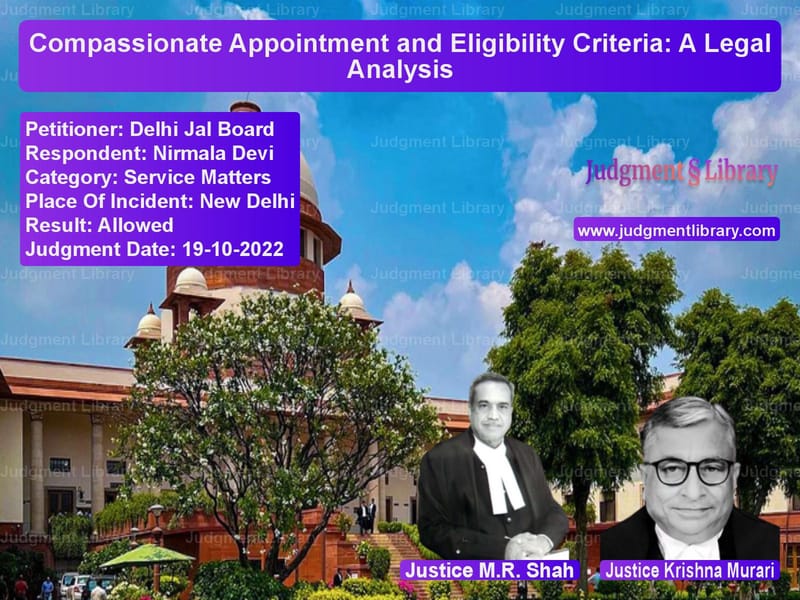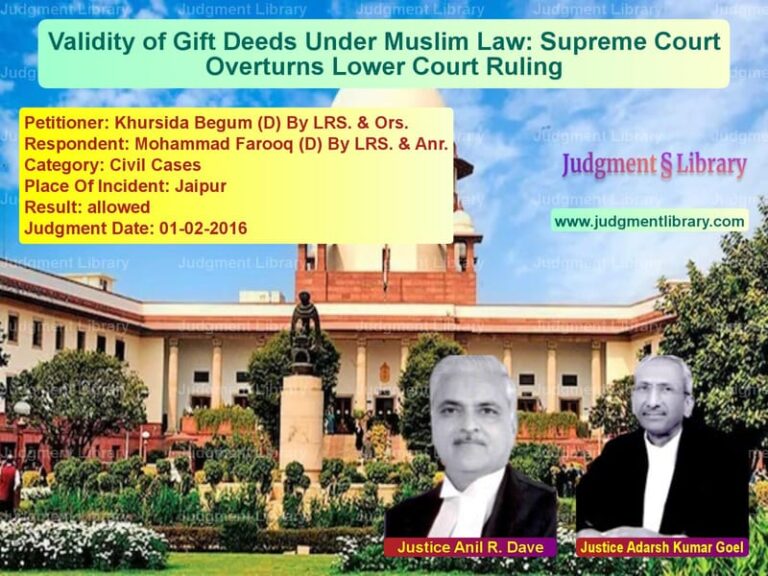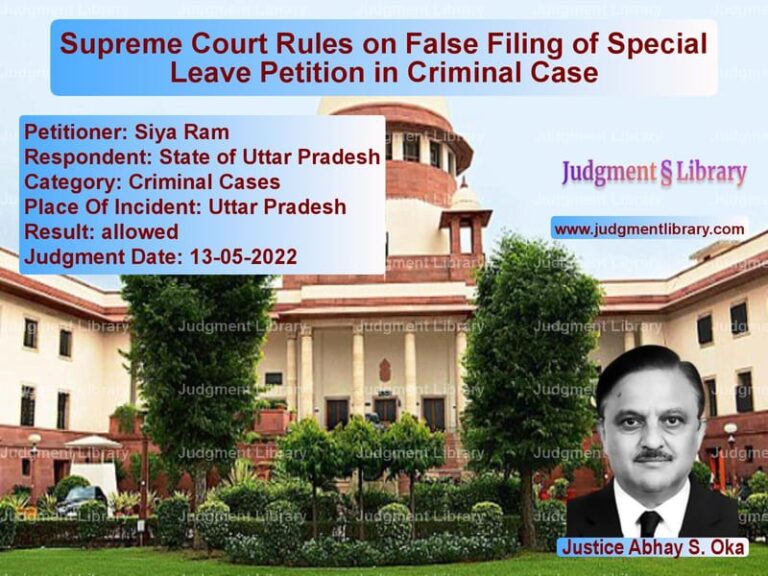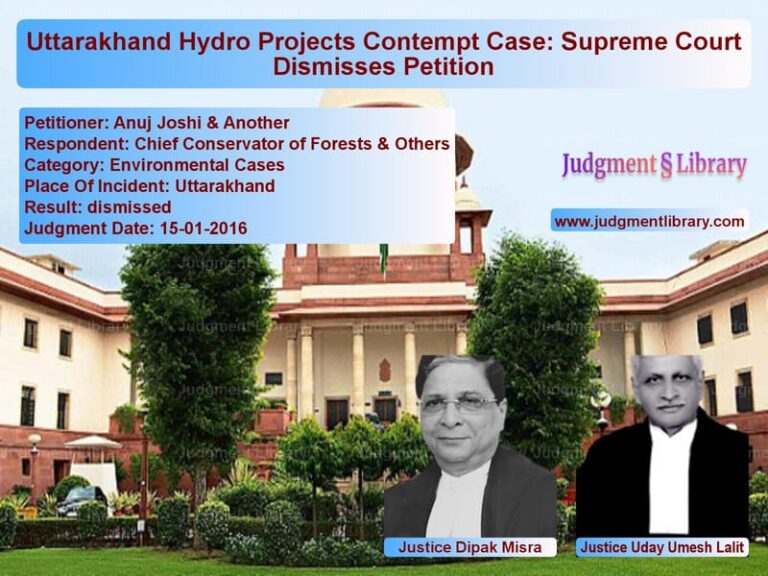Compassionate Appointment and Eligibility Criteria: A Legal Analysis
This case concerns a dispute over compassionate appointment to a government post and the eligibility of the respondent’s daughter for the position of Lower Division Clerk (LDC) in the Delhi Jal Board. The appellant, Delhi Jal Board, challenges the decision of the High Court which upheld the order of the Central Administrative Tribunal (Tribunal) directing the appointment of the respondent’s daughter to the post of LDC. The issue revolves around the interpretation of the relevant qualification criteria at the time of the application for compassionate appointment and the legalities surrounding the recruitment process.
Background:
The respondent, Nirmala Devi, applied for compassionate appointment for her daughter to the Delhi Jal Board on 23rd March 2010, following the death of her husband. At the time of application, the respondent’s daughter did not meet the educational qualification required for the post of LDC, which was graduation. However, by 2012, her daughter had acquired the necessary qualification and was subsequently appointed as Assistant Meter Reader. The respondent contended that her daughter should have been appointed as LDC instead, as she met the qualification after the application was filed.
The Tribunal, in its order dated 3rd May 2019, agreed with the respondent’s claim and directed the Delhi Jal Board to consider the daughter for the LDC post. The High Court dismissed the appellant’s writ petition, leading to this appeal before the Supreme Court.
Appellant’s Arguments:
The appellant, represented by counsel, argued that the respondent’s daughter did not have the necessary qualification when the application for compassionate appointment was filed in 2010. The appellant emphasized that the eligibility criteria for the LDC post were clear, and the requirement of a graduation degree must be met at the time of application. It was argued that the subsequent acquisition of the qualification after the application was made should not be considered, and that the Tribunal and High Court had made a serious error in directing the appellant to appoint the respondent’s daughter to the LDC post.
Respondent’s Arguments:
The respondent, on the other hand, contended that the application for compassionate appointment was valid within a five-year period, and her daughter acquired the requisite qualification within this period. The respondent argued that the qualification for compassionate appointments should be considered based on the qualifications at the time the application was reviewed, not when it was filed. She also cited the policy which only set an age limit for compassionate appointments, not an educational qualification requirement, which further supported the claim for the LDC post.
Court’s Analysis:
The Court reviewed the legal framework surrounding compassionate appointments and the relevant policies. The Court noted that while the respondent’s daughter acquired the qualification after the application was made, the relevant date for considering the qualification should be when the application was submitted. The Court emphasized that the qualification requirements for government posts should be adhered to at the time of the application, and not retrospectively after acquiring the qualification.
The Court also considered the argument about the flexibility provided under the compassionate appointment policy, particularly the clause that allows some relaxations in certain cases. However, the Court rejected the idea that the policy allowed a retrospective evaluation of qualifications. It reiterated that the date of the application is the relevant benchmark for determining eligibility for the post.
Judgment:
The Supreme Court allowed the appeal and set aside the decisions of the Tribunal and the High Court. The Court held that the appointment of the respondent’s daughter to the post of LDC was not justified, as she did not meet the qualification criteria at the time of the application. The Court concluded that the Tribunal and the High Court had committed an error in directing the appointment. The Court dismissed the original application filed by the respondent for the appointment of her daughter to the LDC post and quashed the orders passed by both the Tribunal and the High Court.
Conclusion:
This judgment underscores the importance of adhering to the qualification criteria set out for government posts at the time of application. The Court emphasized that compassionate appointments should not bypass the established eligibility requirements. The ruling clarifies that qualifications must be met at the time of application, and any subsequent acquisition of qualifications does not retroactively affect eligibility. This decision also reinforces the principle that policies for compassionate appointments should be applied consistently and within the bounds of the law.
Petitioner Name: Delhi Jal Board.Respondent Name: Nirmala Devi.Judgment By: Justice M.R. Shah, Justice Krishna Murari.Place Of Incident: New Delhi.Judgment Date: 19-10-2022.
Don’t miss out on the full details! Download the complete judgment in PDF format below and gain valuable insights instantly!
Download Judgment: delhi-jal-board-vs-nirmala-devi-supreme-court-of-india-judgment-dated-19-10-2022.pdf
Directly Download Judgment: Directly download this Judgment
See all petitions in Employment Disputes
See all petitions in Public Sector Employees
See all petitions in Recruitment Policies
See all petitions in Judgment by Mukeshkumar Rasikbhai Shah
See all petitions in Judgment by Krishna Murari
See all petitions in allowed
See all petitions in supreme court of India judgments October 2022
See all petitions in 2022 judgments
See all posts in Service Matters Category
See all allowed petitions in Service Matters Category
See all Dismissed petitions in Service Matters Category
See all partially allowed petitions in Service Matters Category







